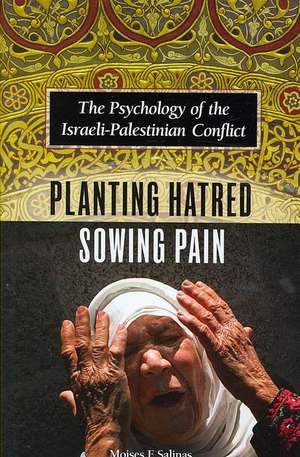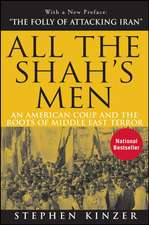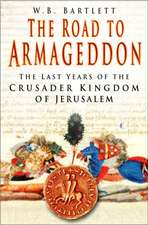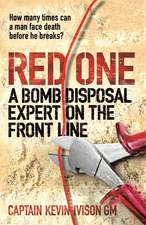Planting Hatred, Sowing Pain: The Psychology of the Israeli-Palestinian Conflict
Autor Moises F. Salinasen Limba Engleză Hardback – 29 mai 2007 – vârsta până la 17 ani
Preț: 354.76 lei
Preț vechi: 414.54 lei
-14% Nou
Puncte Express: 532
Preț estimativ în valută:
67.89€ • 70.48$ • 56.61£
67.89€ • 70.48$ • 56.61£
Carte tipărită la comandă
Livrare economică 25 martie-08 aprilie
Preluare comenzi: 021 569.72.76
Specificații
ISBN-13: 9780275990053
ISBN-10: 0275990052
Pagini: 200
Dimensiuni: 156 x 235 x 22 mm
Greutate: 0.46 kg
Editura: Bloomsbury Publishing
Colecția Praeger
Locul publicării:New York, United States
ISBN-10: 0275990052
Pagini: 200
Dimensiuni: 156 x 235 x 22 mm
Greutate: 0.46 kg
Editura: Bloomsbury Publishing
Colecția Praeger
Locul publicării:New York, United States
Notă biografică
Moises F. Salinas is Associate Professor of Psychology at Central Connecticut State University. The author of a previous Praeger work The Politics of Stereotype (2003) Salinas spent part of 2005 and 2006 in the Middle East conducting interviews and research for this book. His undergraduate degree is from Hebrew University and his Ph.D. in Educational Psychology is from the University of Texas, Austin.
Recenzii
This well-written, well-organized book looks beyond the political barriers to peace in the Israeli-Palestinian conflict. Salinas argues that to truly understand and overcome the obstacles leading to a possible permanent solution one must take into account the social and psychological factors that are central to the conflict and its resolution: (1) stereotypes and prejudices, (2) extremism, (3) trauma, and (4) reconciliation. After a brief historical introduction, he devotes a chapter to each of these factors..Recommended. Upper-division undergraduates through faculty and professionals.
Planting Hatred, Sowing Pain is an important contribution..[t]he reader indirectly experiences the hatred and fears lived by ordinary human beings on both sides. For this alone, the book is worthwhile.
The persistence of the conflict between Israel and Palestinians cannot be accounted for by political factors, says Salinas, so he looks for obstacles to peace in the psychological realm. Among the psychological factors he finds central to the conflict and its resolution are stereotypes and prejudices, extremism, trauma, and reconciliation.
Through extensive interviews (with Jews conducting those with Jews and Palestinians conducting those with Palestinians to assure that both sides are fairly represented), he explores the psychological factors that have made the situation seemingly stuck in granite. He begins by summarizing the history of the conflict and then each chapter explores in turn prejudice, pain, hatred and hope. Most of this won't be new to people who have read about the damaging affects of prejudice and trauma, but through the substantial detail and juxtaposition of the voices of Palestinians and Israelis, we can see that they experience trauma in the same way. This goes a long way in creating empathy and breaking down stereotypes..The extensive interviews needed for his book brought him into the heart of individual suffering for both Israelis and Palestinians. Although he understood this trauma intellectually, he found himself deeply shocked and saddened at the suffering of the Palestinians who were interviewed.
Planting Hatred, Sowing Pain is an important contribution..[t]he reader indirectly experiences the hatred and fears lived by ordinary human beings on both sides. For this alone, the book is worthwhile.
The persistence of the conflict between Israel and Palestinians cannot be accounted for by political factors, says Salinas, so he looks for obstacles to peace in the psychological realm. Among the psychological factors he finds central to the conflict and its resolution are stereotypes and prejudices, extremism, trauma, and reconciliation.
Through extensive interviews (with Jews conducting those with Jews and Palestinians conducting those with Palestinians to assure that both sides are fairly represented), he explores the psychological factors that have made the situation seemingly stuck in granite. He begins by summarizing the history of the conflict and then each chapter explores in turn prejudice, pain, hatred and hope. Most of this won't be new to people who have read about the damaging affects of prejudice and trauma, but through the substantial detail and juxtaposition of the voices of Palestinians and Israelis, we can see that they experience trauma in the same way. This goes a long way in creating empathy and breaking down stereotypes..The extensive interviews needed for his book brought him into the heart of individual suffering for both Israelis and Palestinians. Although he understood this trauma intellectually, he found himself deeply shocked and saddened at the suffering of the Palestinians who were interviewed.









